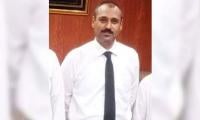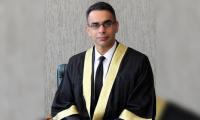PESHAWAR: The Supreme Court on Wednesday dissolved the Board of Governors (BoGs) of all the Khyber Pakhtunkhwa Medical Teaching Institutions (MTI) hospitals after declaring their performance unsatisfactory.
“On account of unsatisfactory performance of the BoGs of the KP government MTIs hospitals, we are exercising jurisdiction to do justice by directing all the BoGs dissolved,” a two-member Supreme Court bench comprising Chief Justice Mian Saqib Nisar and Justice Mushir Alam passed the order.
The order was passed on complaints of the Young Doctors Association that the previous Pakistan Tehreek-e-Insaf (PTI)-led government had appointed one member in each BoG and had made decisions in violation of the MTI Act.
The court directed the chief secretary Khyber Pakhtunkhwa to prepare a summary for constitution of new BoGs and appoint new persons after approval from the caretaker cabinet within one month.
However, the court stated that the existing BoGs would continue and perform duty for three weeks. The development came during hearing of the suo moto case related to Ayub Teaching Hospital (ATH) in Abbottabad.
During hearing, Major General (Retd) Asif Ali Khan, chairman, BoGs, ATH, submitted that the condition of the hospital was very pathetic when he took the charge.
He said he had submitted a report in the court and devised a strategy to improve the hospital by removing the hospital director and dean.
However, he said, the hospital lacked funds to immediately improve its condition. Secretary Health Abid Majeed said the government would provide more funds for the improvement of the hospital.
Chief Justice of Pakistan Mian Saqib Nisar had paid a surprise visit to ATH in Abbottabad and took notice of suffering of the patients and alleged corruption, misappropriation of funds and illegal appointments.
Separately, in a suo moto case related to discharge of industrial effluent to the rivers and canals in the province, the Supreme Court directed that the next government should keep the plan for disposal of industrial waste on top priority.
Chief Secretary Muhammad Azam Khan admitted that the legislature and executive of the province under the former PTI-led government had failed to work on this plan. “I repeatedly told the government to work on this scheme. The former chief minister also felt sorrow and showed concern at the non-completion of plan to make rivers and kanals clean,” the chief secretary told the court.
However, he said the government had prepared a three year plan for disposal of industrial waste through waste treatment plants, sewerage lines and dumping sites.
KP Advocate General Abdul Latif Yousafzai also appeared in the cases on behalf of the government.
About the suo moto case on air pollution in the province, the court directed the chairman Environmental Tribunal Khyber Pakhtunkhwa to submit three months record of the cases at next hearing.
The chief justice observed that Peshawar was one of the most polluted cities in the world and asked Secretary Environment Nazar Hussain Shah about the steps the government had taken.
The secretary said that he had submitted a report according to which there were seven cement plants, 25 steel furnaces, 14 companies of chip boards, 675 stone-crushing plants, 881 brick kilns and six sugar mills, which were causing air pollution.
He said the Environmental Protection Agency had filed 828 cases in the Environmental Tribunal of which 279 were decided and Rs249 million fines were imposed on the violators.
The chief justice took notice of high number of cases pending before the Environmental Tribunal and directed the chairman to appear along with record at the next hearing.
In a suo moto case related to police and military checkposts, the Supreme Court showed satisfaction over the reports presented in the court.
The chief secretary presented the report in the court and informed it that there were total of 84 checkposts in the city including 59 of police and 25 of military. He said that after court order 36 police and seven military checkposts had been removed.
The chief secretary said the remaining ones were not removed for security reasons. He said that 13 roads had been blocked of which eight were opened.
The official said that barricades were removed from 37 buildings which were erected due to security of the buildings. The bench disposed of the case.
Over 3,000 lawyers cast their votes in the election for the PHCBA in Peshawar
Mohsin Naqvi has ordered reinforcing security protocols for foreign nationals residing in Islamabad
Sindh Wildlife Department said the peacocks died of viral Ranikhet disease
The estimated value of the drugs in the international market was said to be Rs1 billion







